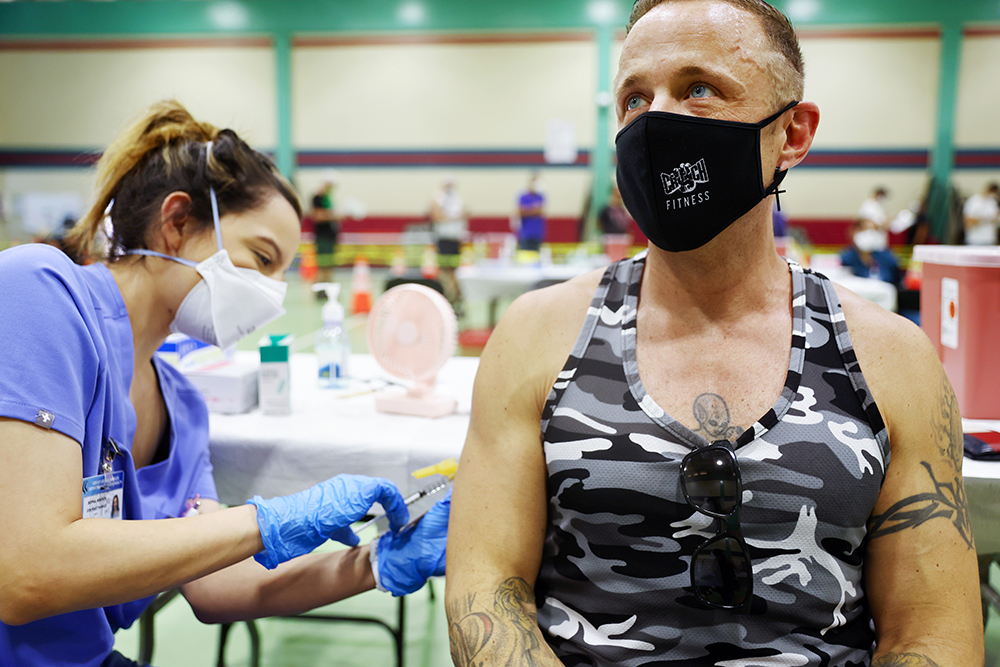
猴痘是性傳播疾病嗎(STD)?
到目前為止,,在全球猴痘爆發(fā)的近48,000例病例中,,絕大多數(shù)發(fā)生在與同性發(fā)生性關(guān)系的男性身上,新近研究已經(jīng)在精液中發(fā)現(xiàn)了該病毒,。世界衛(wèi)生組織的官員在7月也表示,,猴痘可能與“性接觸”有關(guān)。
但性生活中通常會傳播病毒的密切接觸行為也有可能不會導(dǎo)致傳染,。精液中發(fā)現(xiàn)的病毒并不意味著精液是導(dǎo)致感染的原因,。世界衛(wèi)生組織稱,仍在評估最近變異病毒的傳播途經(jīng),。
流行病學(xué)家則表示,,密切接觸傳播和性傳播之間很難區(qū)分。
不管怎樣,,對普通人來說,,這些可能并不重要。
“疫情爆發(fā)之際,,討論過多反而分散注意力,。”美國國家性病聯(lián)盟董事會的執(zhí)行主任戴維·哈維告訴《財富》雜志,。
模糊的類別
專家說,,之所以出現(xiàn)該問題,主要是因為針對性傳播疾病或感染沒有明確的定義,。
哈維和其他專家指出,,很大程度上講,猴痘是否屬于性傳播感染(STI)取決于語義表述,。爭論點在于,,潛在致命的病毒是否僅僅是性途經(jīng)“可傳染”(顯然是),還是真正的性“傳染”,。
“說實話,,性傳播感染的定義相當(dāng)隨意?!卑⒗婉R大學(xué)伯明翰分校(University of Alabama Birmingham)的馬尼克斯·赫爾辛克醫(yī)學(xué)院(Marnix E. Heersink School of Medicine)的傳染病教授愛德華·胡克博士在接受《財富》雜志采訪時表示,。
“接吻會感染流感,,接吻也會感染鏈球菌性咽喉炎,但人們沒有將其歸入性傳播感染,?!焙苏f,他還擔(dān)任美國性健康協(xié)會(American Sexual Health Association)的科學(xué)顧問,。
寨卡病毒(Zika)和埃博拉病毒(Ebola)也可以通過性分泌物傳播,,只是不常見,“人們認(rèn)為這些病毒不屬于性傳播,?!惫S說。
哈維指出,,皰疹,、梅毒和衣原體感染等等眾所周知的性病并不完全通過性傳播,也能夠通過其他方式傳播,,例如分娩,。
胡克指出,丙肝也經(jīng)常被認(rèn)為是性病,,然而實際上很少通過性傳播,,其他傳播方式才更常見,比如吸毒期間共用針頭,。
雙刃劍
胡克說,,宣布猴痘為性病有一定好處,因為一些保單規(guī)定只有納入性病范疇才可以覆蓋猴痘免費診斷和治療,,這對無力支付治療費用的人以及公共衛(wèi)生和安全都有極大益處,。
但也存在缺點,就是污名化,,其實不管猴痘還是性傳播感染預(yù)防都會受之影響,。
“美國在性和性健康方面的污名問題尤其嚴(yán)重?!焙苏f,?!斑@會妨礙人們積極治療,。不少患者不愿意要求檢查,也不愿意提供詳細(xì)的(醫(yī)療)記錄,,從而推動持續(xù)傳播,。”
無名火不僅讓患者不愿意開口,,也影響醫(yī)生提問,。他補(bǔ)充說,,如果患者對談?wù)撔愿械讲皇娣t(yī)療方可能就選擇不詢問患者的性生活史,,也可能不檢測性傳播疾病,。
“出于種種原因,以往美國報告的淋病和梅毒等性傳播感染發(fā)病率在西方世界都是最高的,,而且花的資金更多,。”他說,。
專家表示,,猴痘顯然與性有關(guān),但重點應(yīng)該是坦率對話,,用正確的信息教育公眾,。不應(yīng)該浪費時間鉆牛角尖。
“我認(rèn)為,,現(xiàn)在必須關(guān)注的是如何戰(zhàn)勝疫情,。”哈維說,?!斑@意味著不要過于糾結(jié)術(shù)語,避免污名化,,提供對健康有益的明確信息教育公眾,。”(財富中文網(wǎng))
譯者:夏林
猴痘是性傳播疾病嗎(STD),?
到目前為止,,在全球猴痘爆發(fā)的近48,000例病例中,絕大多數(shù)發(fā)生在與同性發(fā)生性關(guān)系的男性身上,,新近研究已經(jīng)在精液中發(fā)現(xiàn)了該病毒,。世界衛(wèi)生組織的官員在7月也表示,猴痘可能與“性接觸”有關(guān),。
但性生活中通常會傳播病毒的密切接觸行為也有可能不會導(dǎo)致傳染,。精液中發(fā)現(xiàn)的病毒并不意味著精液是導(dǎo)致感染的原因。世界衛(wèi)生組織稱,,仍在評估最近變異病毒的傳播途經(jīng),。
流行病學(xué)家則表示,密切接觸傳播和性傳播之間很難區(qū)分,。
不管怎樣,,對普通人來說,這些可能并不重要,。
“疫情爆發(fā)之際,,討論過多反而分散注意力,。”美國國家性病聯(lián)盟董事會的執(zhí)行主任戴維·哈維告訴《財富》雜志,。
模糊的類別
專家說,,之所以出現(xiàn)該問題,主要是因為針對性傳播疾病或感染沒有明確的定義,。
哈維和其他專家指出,,很大程度上講,猴痘是否屬于性傳播感染(STI)取決于語義表述,。爭論點在于,,潛在致命的病毒是否僅僅是性途經(jīng)“可傳染”(顯然是),還是真正的性“傳染”,。
“說實話,,性傳播感染的定義相當(dāng)隨意?!卑⒗婉R大學(xué)伯明翰分校(University of Alabama Birmingham)的馬尼克斯·赫爾辛克醫(yī)學(xué)院(Marnix E. Heersink School of Medicine)的傳染病教授愛德華·胡克博士在接受《財富》雜志采訪時表示,。
“接吻會感染流感,接吻也會感染鏈球菌性咽喉炎,,但人們沒有將其歸入性傳播感染,。”胡克說,,他還擔(dān)任美國性健康協(xié)會(American Sexual Health Association)的科學(xué)顧問,。
寨卡病毒(Zika)和埃博拉病毒(Ebola)也可以通過性分泌物傳播,只是不常見,,“人們認(rèn)為這些病毒不屬于性傳播,。”哈維說,。
哈維指出,,皰疹、梅毒和衣原體感染等等眾所周知的性病并不完全通過性傳播,,也能夠通過其他方式傳播,,例如分娩。
胡克指出,,丙肝也經(jīng)常被認(rèn)為是性病,,然而實際上很少通過性傳播,其他傳播方式才更常見,,比如吸毒期間共用針頭,。
雙刃劍
胡克說,,宣布猴痘為性病有一定好處,,因為一些保單規(guī)定只有納入性病范疇才可以覆蓋猴痘免費診斷和治療,,這對無力支付治療費用的人以及公共衛(wèi)生和安全都有極大益處。
但也存在缺點,,就是污名化,,其實不管猴痘還是性傳播感染預(yù)防都會受之影響。
“美國在性和性健康方面的污名問題尤其嚴(yán)重,?!焙苏f?!斑@會妨礙人們積極治療,。不少患者不愿意要求檢查,也不愿意提供詳細(xì)的(醫(yī)療)記錄,,從而推動持續(xù)傳播,。”
無名火不僅讓患者不愿意開口,,也影響醫(yī)生提問,。他補(bǔ)充說,如果患者對談?wù)撔愿械讲皇娣?,醫(yī)療方可能就選擇不詢問患者的性生活史,,也可能不檢測性傳播疾病。
“出于種種原因,,以往美國報告的淋病和梅毒等性傳播感染發(fā)病率在西方世界都是最高的,,而且花的資金更多?!彼f,。
專家表示,猴痘顯然與性有關(guān),,但重點應(yīng)該是坦率對話,,用正確的信息教育公眾。不應(yīng)該浪費時間鉆牛角尖,。
“我認(rèn)為,,現(xiàn)在必須關(guān)注的是如何戰(zhàn)勝疫情?!惫S說,。“這意味著不要過于糾結(jié)術(shù)語,,避免污名化,,提供對健康有益的明確信息教育公眾。”(財富中文網(wǎng))
譯者:夏林
Is monkeypox an STD?
By now we know that a vast majority of the nearly 48,000 cases in the global monkeypox outbreak have occured in men who have sex with men, that recent studies have identified the virus in semen, and that World Health Organization officials said in July that it may be linked to “penetrative contact.”
But the kind of close contact that occurs during sex and often spreads the virus can occur apart from it, too. The virus being found in semen doesn’t mean the fluid is responsible for infections. And the WHO says it’s still assessing just how transmission occurs with a virus that appears to have recently mutated.
It’s just really difficult to tease apart close-contact spread from sexual spread, epidemiologists say.
And none of it may matter—not to the average person, anyway.
“At this point in the outbreak, the debate is somewhat of a distraction,” David C. Harvey, executive director of the National Coalition of STD Directors, told Fortune.
A nebulous category
Part of the issue here is there’s actually no one set definition for sexually transmitted diseases or infections, experts say.
Whether or not monkeypox is an STI is largely a case of semantics, Harvey and other experts say. The argument: whether the potentially deadly virus is merely sexually “transmissible” (it is, clearly) or if it’s truly sexually “transmitted.”
“The definition of what an STI is, is, quite honestly, pretty arbitrary,” Dr. Edward Hook, a professor of infectious diseases at the University of Alabama Birmingham’s Marnix E. Heersink School of Medicine, told Fortune.
“You can get influenza from kissing, or strep throat from kissing, yet we don’t call them STIs,” said Hook, who’s also a scientific advisor to the American Sexual Health Association.
Although uncommon, Zika and Ebola can also be transmitted through sex via gential secretions, “but we don’t consider them sexually transmitted,” Harvey said.
Some well-known STDs, such as herpes, syphilis, and chlamydia, aren’t exclusively sexually transmitted and can be passed along in other ways, like through childbirth, Harvey pointed out.
And another disease commonly thought of as an STD, Hepatitis C, is actually rarely transmitted through sex and is more commonly transmitted through other means, like sharing needles during drug use, Hook pointed out.
A double-edged sword
There is a certain advantage to declaring monkeypox an STD: Some insurance policies require no-cost diagnosis and treatment of such, Hook said—a significant benefit to those who couldn’t afford treatment otherwise, and to public health and safety.
But there’s a downside, too: stigma, which hampers prevention efforts of monkeypox and all STIs, to be frank.
“America in particular has a problem with stigma related to sex and sexual health,” Hook said. “It keeps people from seeking care. It makes patients unwilling to ask for tests and give appropriate [medical] history, and therefore promotes continued transmission.”
Stigma doesn’t just keep patients from talking—it keeps doctors from asking. Health care providers may choose to not ask patients for sexual histories, or to test for sexually transmitted diseases, if they’re uncomfortable talking about sex, he added.
“For these reasons, the U.S. has the highest rates of traditionally reported STIs like gonorrhea and syphilis in the entire Western world—despite spending more money” on the issue than any other region, he said.
Monkeypox is clearly sexually associated, experts say. The focus should be on educating the public with accurate information, through frank conversations. Time shouldn’t be wasted splitting hairs.
“I think what we have to focus on these days is how we’re going to conquer this outbreak,” Harvey said. “And it means not getting wrapped up in the term, avoiding the stigma, and educating people explicitly with the information they need to protect their health.”






